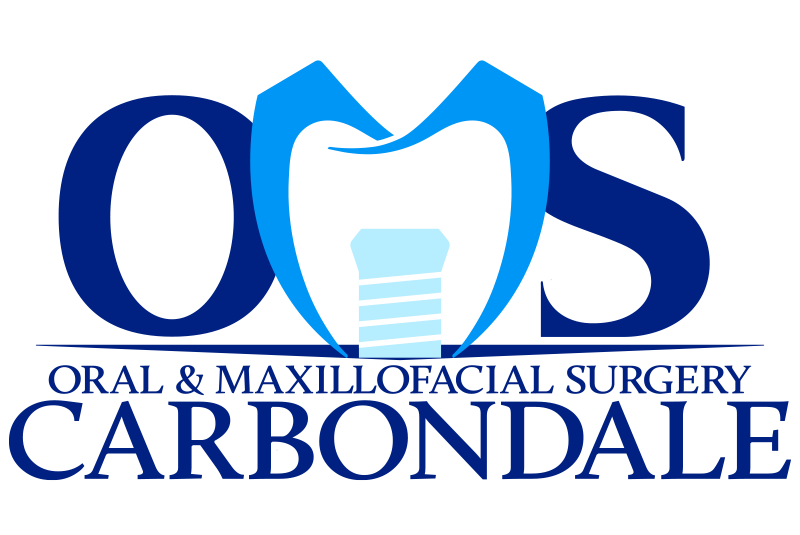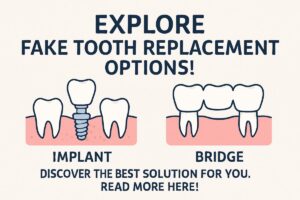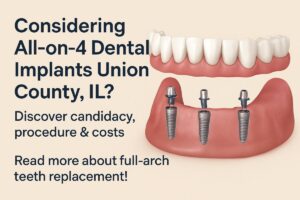For a quick answer to the H1: denture implants are dental implants that anchor or retain a denture to give long‑term stability and improved chewing. They matter because they stop slipping, preserve jaw bone, and let you eat and speak more naturally. This guide is for patients near Carbondale, IL seeking expert planning and care, and it walks through what denture implants are, who should consider them, the process, and how oral surgeons and your general dentist work together.
What Are Denture Implants?
Simply put, what are denture implants are dental implants that support or remain attached to dentures. You may hear them called implant‑retained or implant‑supported dentures. Instead of a removable plate that sits on the gums, the denture snaps or screws onto implant posts placed in the jaw. That connection gives much better stability, function, and comfort than traditional removable dentures.
Types used by oral surgeons
Oral surgeons typically use two main implant types for denture support:
- Endosteal implants: Titanium posts placed directly into the jawbone. These are the most common choice for supporting dentures when there is sufficient bone.
- Zygomatic implants: Longer implants anchored in the cheek (zygoma) bone. Used when upper jaw bone is severely resorbed and traditional implants are not possible without extensive grafting.
How Denture Implants Differ From Regular Dentures
Denture implants provide far greater stability than removable dentures. That stability improves chewing power, reduces sore spots, helps preserve bone, and often improves speech. Regular dentures sit on top of the gums and can slip, especially when eating or talking; implant‑supported dentures lock into place.
Who benefits most?
Best candidates are people who:
- Have multiple missing teeth or full‑arch tooth loss
- Tired of dentures that slip
- Want improved chewing and nutrition
Not every patient is a candidate right away. Significant untreated medical conditions, uncontrolled diabetes, heavy smoking, or severe bone loss may require medical management or grafting before implants. Your surgeon will review risks and suitability.
The Implant Process: What to Expect
Typical steps include:
- Comprehensive evaluation and medical review
- CBCT imaging and digital planning
- Surgery to place implant posts and abutments
- Healing period with monitoring
- Your general dentist delivers and adjusts the final prosthesis
When clinically appropriate, same‑day tooth extraction into implant post placement is done most of the time, allowing efficient care and fewer surgeries. Healing times vary by case and health.
Timing and planning
There is no same‑day consult to surgery — careful case review matters. Preoperative planning using CBCT scans and medical review helps avoid complications and optimizes long‑term results. Your health and surgical plan determine timing.
The Roles: Oral Surgeon vs Your General Dentist
The oral surgeon focuses on safe, precise implant placement and surgical care. Surgeons use advanced tools to improve accuracy and outcomes, such as Intraoral Scanner (IS 3800W), X‑Guide 3D Dynamic Navigation, CBCT, Osstell ISQ, Platelet‑Rich‑Fibrin (PRF), PerioLase® MVP‑7™, PIEZOSURGERY®, and AccuVein to map anatomy, guide placement, and monitor stability.
Importantly, the surgeon places the implant posts and abutments but does not place the final denture teeth.
Role of your GP
Your local, trusted general dentist fabricates, fits, and adjusts the final denture prosthesis. They handle esthetic choices, final occlusion (bite), and ongoing restorative care. Close collaboration between the surgeon and your GP ensures the surgical plan matches the prosthetic plan for the best function and appearance.
Benefits, Risks, and Long‑Term Care
Main benefits:
- Stable, secure denture fit
- Improved chewing and nutrition
- Better speech and comfort
- Preservation of jawbone volume over time
Risks are uncommon but can include infection, implant failure, need for bone grafting or sinus lift, and prolonged healing in some patients. Regular checkups, good oral hygiene, and professional maintenance extend implant life.
Finding Expert Care Near Carbondale, IL
If you live by or near Carbondale, IL and surrounding counties, look for an oral surgeon who prioritizes patient health, detailed planning, and teamwork with your dentist. This practice values each patient’s individual needs, offers full‑time collaboration with 24‑hour availability via personal cell phones, and focuses on delivering maximum value through careful, evidence‑based care. The office is about 15 minutes from Carbondale, IL and serves Jackson, Williamson, Johnson, Union, Franklin, Perry, and Randolph counties.
Why collaborative care matters
Working closely with your GP ensures your final denture fits well, looks natural, and functions properly. Advanced planning between the surgeon and dentist reduces surprises and improves long‑term oral health outcomes.
Other Oral Surgery Services Offered
- Tooth extractions and impacted tooth removal
- Bone grafting and sinus lifts
- Pathology exams and biopsies
- PRF treatments to support healing
These services support successful implant treatment when needed.
Next Steps
If you have questions about "what are denture implants" or want to discuss implant planning near Carbondale, IL, request an evaluation with an oral surgeon who will review your case carefully, coordinate with your general dentist, and explain the safest, most predictable path to a stable denture.





